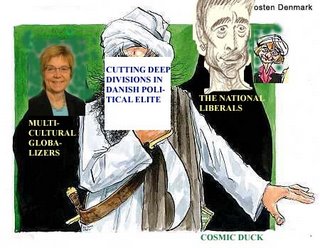Mohammed crisis creates deep divisions in Danish political elite

It is becoming more and more apparent how the Mohammed crisis is creating deeper and deeper division in the Danish political elite. On one side you find the National liberalists under the leadership of the prime minister Anders Fogh Rasmussen, his young liberalist "lions" like the minister of taxation Christian Jensen, and political spokesman for the parliamentary group Jens Rohde, and leader of the Danish People's Party Pia Kjaersgaard. On the other side you find leader of the Social Liberals Marianne Jelved, the Social Democrats and the left parties. But on this side you also find a number of Conservatives, like the minister of foreign affairs Per Stig Moller. On this side you also find some business people, who find it increasingly difficult to manouvre with their companies because of the bad reputation the crisis has given the Danes abroad. This side you may call the multicultural globalisers.
It was Anders Fogh Rasmussen who started the manichean-splitting-up game when he talked of the increasing necessity of separating the sheep from the goats in the debate over freedom of expression. Now many people wonder why it was so urgent to separate the good, the chosen ones, from the bad, the lost ones, in an almost biblical need to cleanse the turf of "infidels" - especially when there was no factual disagreement about the principles of freedom of speech. - Which is why some commentators say that the real issue is another one. It is the Danes' fear of globalisation and how to deal with it that is the real core issue!
Now he runs the risk of seeing his party drifting away from the centre he has coveted so eagerly in his efforts to secure his hold on power. He's landed so securely in Pia Kjaersgaard's xenophobic lap that it has become more and more detestable to a lot of his core electorate and to traditional backers of the liberalist party in the business community.
Business leaders are now saying they'll cut donations to the Liberalists' (Venstre's) election campaigns in future. Jens Rohde's suggestion to Arla that it can move its business to Teheran if the company wants to "put freedom of speech at stake for two litres of milk" has shocked parts of the business community in Denmark. Venstre, the Liberalists, have traditionally been the most pro-business party in Danish politics.

2 Comments:
Thank you for this post and for your valuable comment on my last post. I posted an answer to it in the comment section on my blog. I always enjoy your cartoons. My favourite cartoonist is Steve Bell (The Guardian).
As for the cartoon row and its aftermath (if there is any because it still going on), as you said, the fear of globalization is fuelling xenophobic reactions in european countries and it complicates matters for immigrants integration.
However, I am sure that the party of Mr. Rasmussen will find a way to land on its feet (a french expression). What you call the 'center' in politics is not a center built on principle but politicians moving from both directions, left and right, whenever it suits them to grab more electorate. Now that Mr. Rasmussen have served well his neo-con fanatic zionist friends in the US (there was a relation established between the Jyllandsposten and Daniel Pipes, a famous zionist neocon lobbyyist in the US, he can turn agai n his coat to recuperate the slipping electorate because there was no accountability in this affair !
Sophia.
You're right about the centre. In Denmark it is extremely slippery and moving back and forth.
Post a Comment
<< Home